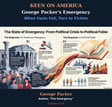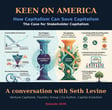
The Revenge Addiction: How Trump's Vengeful Brand is America's Deadliest Drug
Revenge has become Donald Trump’s brand. That, at least, is the view of James Kimmel Jr, author of The Science of Revenge, who argues that revenge has become America’s “deadliest addiction”. When we feel wronged, he says, our pain centers activate, triggering dopamine-releasing reward circuits that create pleasure from fantasizing about retaliation. This neurological pattern mirrors classic forms of substance addiction, and explains everything from street violence to Trump's "revenge brand" politics. Kimmel contends that roughly 20% of people become compulsively vengeful, driving most societal violence throughout history. The antidote? FORGIVENESS, which neuroscience shows actually eliminates pain rather than just masking it. Kimmel’s provocative thesis suggests treating revenge like other addictions through public health approaches and potentially even pharmaceutical interventions.
five key takeaways
* Revenge is neurologically identical to drug addiction - Brain scans show that revenge-seeking activates the same dopamine reward circuits as substance abuse, making it literally addictive.
* All violence stems from perceived victimization - From mass shootings to genocide, perpetrators first see themselves as victims seeking "righteous" retaliation for real or imagined grievances.
* Forgiveness is a neurological "superpower" - Unlike revenge's temporary dopamine hit, forgiveness actually deactivates brain pain networks and permanently eliminates trauma rather than just covering it up.
* Trump represents America's "revenge brand" - The current political climate reflects a nation caught in collective revenge addiction, with both sides seeking retaliatory pleasure for past grievances.
* We need addiction-style treatment for violence - Just as we treat alcoholism with medical interventions, revenge addiction could be addressed through public health campaigns, education, and potentially pharmaceutical solutions.
James Kimmel, Jr., J.D. is a lawyer, a lecturer in psychiatry at the Yale School of Medicine, and the founder and co-director of the Yale Collaborative for Motive Control Studies. A breakthrough scholar and expert on revenge and forgiveness, James first identified compulsive revenge seeking as an addiction. He developed the behavioral addiction model of revenge and the brain disease model of revenge addiction as public health approaches for preventing and treating violence. He made the study of revenge and forgiveness his life's work after nearly committing a mass shooting as a teenager. James created The Nonjustice System and the related Miracle Court App for healing from grievances and victimization, controlling revenge cravings and revenge addiction, and empowering forgiveness. He is a leader in expanding local, state, and national violence t


















